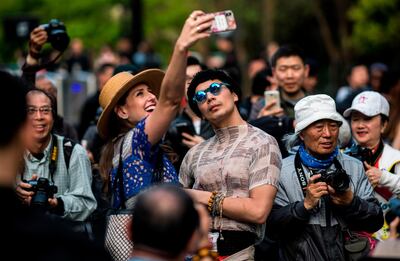It will always be an uneasy relationship. On the one side, traditional journalists, many of whom are specialists in their fields and have spent years amassing contacts, knowledge and experience; on the other, influencers, modern-day entrepreneurs with huge social media followings who have immense power to sway public opinion. Each side views the other with a certain measure of condescension. Many journalists see influencers as upstarts; influencers no doubt see us as outdated and out-of-touch.
Lifestyle journalists have been granted front-row seats to the meteoric rise of influencers in this region. We have watched on as they replaced seasoned editors on the front rows of fashion weeks; and have taken precedence over traditional media at industry events. In many instances, we have played witness to a growing (and misplaced) sense of entitlement and self-aggrandisement (a lot of foot-stamping and "do you know who I ams"). Which to those of us with journalism degrees, 15 years of experience and the ability to write in full sentences, seems a little unnecessary.
Advertising departments are reassured because influencers come with a figure attached to them - a certain number of followers, a certain number of likes. There is something tangible and, as such, reassuring, in this. Influencers are perceived as quantifiable, in a way that traditional media platforms are sometimes not. Many brands, in a panic because they don't want to be perceived as out of touch with a millennial audience, have jumped headlong onto the influencer band wagon, with little real thought as to who and what they are actually endorsing.
Bitter? Me? No, actually. I believe there is room for us all - readers deserve and indeed demand varied viewpoints and diverse channels from which to gather information. But they also deserve (and should demand) transparency. Readers have a responsibility, much like brands do, to be discerning in who and what they endorse. Who are those influencers actually influencing? What kind of an influence are they actually having? What do they stand for? What is their message? And does that message hold any real value?
In the early days, the blogger (the earliest iteration of the influencer) stood as the antithesis of traditional media – subjective, personality-driven, edgy, and unfettered by convention or the whims of advertisers. If a blogger said something was cool, you could trust that it was cool. They were saying it because they believed it.
The scene has been commercialised and, to a certain extent, corrupted, since then. Influencers are now paid obscene amounts of money to promote certain products or viewpoints. And in many instances, authenticity has been lost. Which means trust needs to be rebuilt.
Last month, the UAE’s National Media Council announced that social media businesses that accept money to promote or sponsor content online would need a licence to operate. The aim ultimately is to bring transparency and integrity to a market that has so far been entirely unregulated. The United States Federal Trade Commission introduced measures in September to force influencers to be more transparent, while the British Advertising Standards Authority requires the prominent use of the hashtag #ad to comply with consumer protection legislation.
Influencers who are in it for the right reasons will surely agree with the need to offer their followers more clarity. In a story in The National this week, Rhodri Marsen quoted Stephi LaReine, a lifestyle influencer with more than 50,000 followers on Instagram, as saying: "It seems obvious to me to be clear about monetisation. Some bloggers and influencers may disagree, but having an audience that trusts your words and thoughts is far more valuable than anything you're gifted or paid for."
Transparency is key. Then I’ll know who you really are.
________________
Read more from Selina:
Why a goodbye in the UAE can be particularly bittersweet
Four lessons learnt as a dog owner in Dubai
Writing Dubai off as one-dimensional only shows your own blinkered view
Why ageing in Dubai is a particularly painful process
Maybe the sisterhood does exist, after all
After years of ridicule, my Facebook-free status is now a source of envy – like it or not
________________



